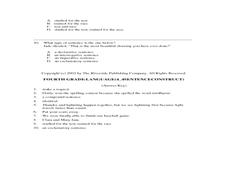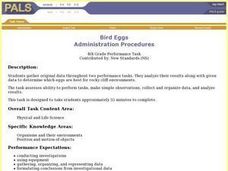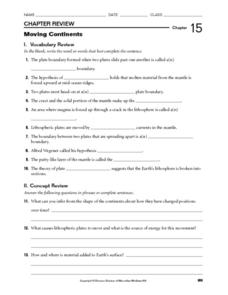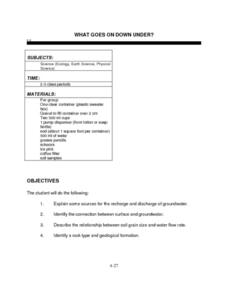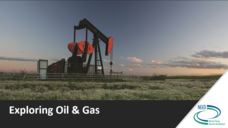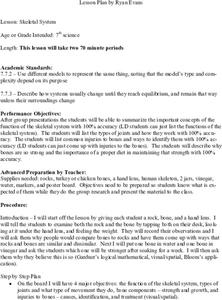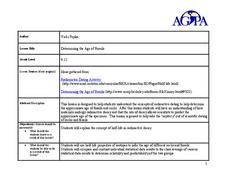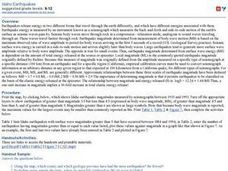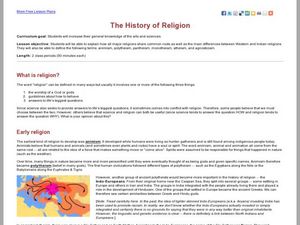Curated OER
Sentence Stucture
In this analyzing sentences worksheet, 4th graders identify purpose, combining, types, and grammar. Students answer 10 questions.
Curated OER
Bird Eggs
Students perform an experiment with different types of bird eggs to determine what factors make them strong and able to stay on a cliff without rolling off.
Curated OER
Separating Sentences With Commas and Conjunctions
In this grammar activity, students analyze and correct ten sentences with proper commas and conjunctions. Students share their answers with their classmates.
Curated OER
Mollusks
In this mollusks worksheet, students complete a crossword puzzle given 15 clues about the structures of mollusks, the characteristics of mollusks and types of mollusks.
Curated OER
Moving Continents
In this moving continents worksheet, students review the different types of plate boundaries, what causes earthquakes, and where volcanoes are formed. This worksheet has 10 fill in the blank and 9 short answer questions.
Curated OER
Measuring Absolute Time
In this absolute time learning exercise, students answer eleven questions about ways to measure the age of fossils. They define half-life, answer questions about radioactive dating, tree rings and varves.
Curated OER
Wind
In this wind worksheet, students fill in 15 different question blanks that related to wind. First, they define wind erosion and what it picks up and why. Then, students determine the most common form of wind deposit and what type of...
Curated OER
Sedimentary Structures- An Adventure in Painting and Collage
Students identify and interpret concepts about how the Earth was formed and convey some of these ideas in a painting.
Students experiment with different types of paints and paint applicators to achieve a variety of visual textures....
Curated OER
What Goes On Down Under?
Young scholars explore the sources for recharge and discharge of groundwater. They research the connection between surface water and groundwater. Students construct a model of an aquifer and explore recharge and discharge of the aquifer.
Science Matters
Wave Watching
Seismologists use the direction and arrival times of p waves and s waves to determine the distance to the source of an earthquake. The engaging instructional activity has students line up to form human waves. Through different movements...
Curated OER
Volcanoes: Second Grade Lesson Plans and Activities
Young geologists explore volcanoes with a series of engaging geology activities. First, they learn the difference between magma and lava before coloring and labeling the parts of a volcano. During the lab, individuals watch a...
National Energy Education Development Project
Exploring Oil and Gas
The United States consumes more oil than any other country, about 1.85 billion barrels (or 77 billion gallons) a day. Viewers learn about the history of fossil fuel exploration and how they are formed in an informative presentation. They...
Chicago Botanic Garden
Climate and Forest Ecosystem Services
Forests, through sequestration, capture excess carbon dioxide in our atmosphere and store it, aiding in climate change. The third installment in a four-part series on how climate impacts forests explores carbon sequestration. Classes...
Curated OER
The Metric System
Applying this metric worksheet, mathematicians will provide standard metric units of measurement, identify the largest and best way to measure items using the metric system, and convert units using King Henry.
Curated OER
Skeletal System
Seventh graders explore the functions of the skeletal system. They collaborate in small groups to determine the function of the skeletal system, the types of joints and movement, bone strength and growth, and bone injuries including...
Curated OER
Determining the Age of Fossils
Students examine the concept of radioactive dating. In this radioactive dating lesson plan, students investigate how to determine the ages of fossils and rocks as they learn about half-life radioactive decay.
Curated OER
Candy Quakes
Eighth graders, using a candy bar, gum, and Twizzlers, demonstrate the effects of deformational forces on the earth's crust. They examine the processes of rock and fossil formation.
Curated OER
Population Densities
Students explore biological impact by completing a worksheet in class. In this animal population lesson, students utilize river rocks and jars to conduct a coqui frog population role play activity. Students define a list of amphibian...
Curated OER
Volcano Study Guide
In this volcano learning exercise, students answer fourteen questions about the types of volcanoes, the types of magma and the types of lava. They label the parts of a volcano.
Curated OER
Idaho Earthquakes
Students examine the types of earthquakes that occur in Idaho. In groups, they compare and contrast the types of energy released and how they affect the movement of the Earth. To end the lesson, they analyze a map showing the magnitudes...
Curated OER
Landslides!
Students discover soil and Earth movement by experimenting in class. In this Earth Science lesson, students utilize a stream table, soil, graduated cylinder and water to create a re-enactment of a landslide. Students simulate different...
Curated OER
The Extraordinary Life of the Alaskan Tundra
Students investigate the characteristics of the tundra on the North Slope of Alaska. They conduct Internet research, develop a chart of the types of vegetation, plant growth, and fauna found on the tundra, identify examples in their own...
Curated OER
Setting Up Equations
In this setting up equations instructional activity, students solve 4 different problems that include setting up the equations in each problem. They write out an equation or set up an equations that describe each given situation. Then,...
Curated OER
The History of Religion
Students learn about the two main types of religions. In this religion lesson, students define religion and learn about early religion as well as religion in the west. Students define animism, polytheism, pantheism, monotheism,...


